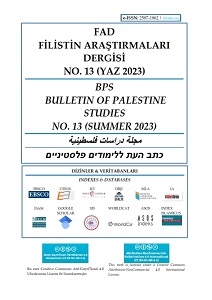Altın Kudüs’e Modern Nakîdalar
Modern Naqa’id for Jerusalem of Gold
Author(s): Zafer CeylanSubject(s): Poetry, Comparative Study of Literature, Post-War period (1950 - 1989)
Published by: Muhammed Mustafa KULU
Keywords: Jerusalem of Gold; Rabbi Akiva; Naomi Shemer; Rahbani Brothers; Mahmoud Darwish;
Summary/Abstract: Jerusalem of Gold is a term used to refer to a special piece of jewellery in the narrative of Rabbi Akiva ben Yosef (AD 40-135), the clergyman who laid the foundations of the Mishnah, which is called the Jewish Sharia in the Talmud. This precious jewel, presumed to be a crown made of gold and stones, is used as an icon representing the city of Jerusalem as a center for the Jews. This term is also used as the title for a poem written by Israeli songwriter Naomi Shemer in 1967. However, the importance of the poem composed and published by Shuli Nathan on May 15, 1967 stems from the fact that it was loved and embraced as if it were the country's second national anthem, right after the Six-Day War, which resulted in Israel's decisive victory. The poem/song had such a great impact that the Arab poets on the opposite front could not remain indifferent to it. Flower of Cities by Assi and Mansour Rahbani brothers and in Quds by Mahmoud Darwish are poems written in this manner. In particular, the poem of the Rahbani Brothers, which was written in 1967, right after the loss of the Six-Day War, and a short time later was composed and converted into a song by Fairuz, reached large audiences and was sung as a naqa’id to “Jerusalem of Gold”. These poems, which we have examined and compared in our essay, can be called as modern naqa’id of the modern period because they can be interpreted as literary exchanges between the parties. These are examples that we can use to understand the concept of "other" not only in today's literature, but also in today's politics, so that we can produce counter-arguments while criticizing the arguments put forward by the other side.
Journal: FİLİSTİN ARAŞTIRMALARI DERGİSİ
- Issue Year: 2023
- Issue No: 13
- Page Range: 2-10
- Page Count: 9
- Language: Turkish

